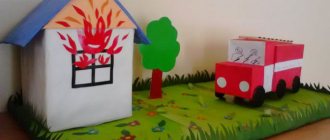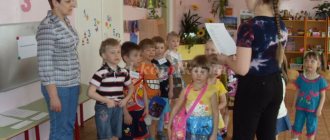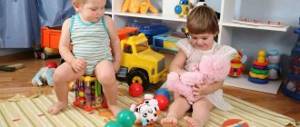Summary of the role-playing game “Family” for kindergarten. Senior group
Summary of the plot-role-playing game in the senior group
Summary of the role-playing game “Family”;
plot “Visiting Grandma” Author: Alla Ivanovna Efimova, teacher of GBDOU No. 43, Kolpino St. Petersburg Description of the material: Lesson notes developed for children of senior preschool age. In the process of collective activity, children learn to take on the role of a caring parent. This material will be useful to teachers working in the senior group. Goal: To develop children's interest in role-playing games. Objectives: - teach children to plan a game, select attributes; — continue training to be able to distribute roles; independently develop the plot of the game; - Expand words knowledge; develop children's dialogical speech; - promote the establishment of friendly relationships between players. Game material: “Family”; — attributes for room equipment; - dishes; - furniture; - bag; - wallet; - money. "Granny's House" - dishes; - samovar; - money; - substitute items. “Store” - seller’s clothes; - cash register; - vegetables, fruits, sweets, etc. "Driver" - steering wheel; - tickets. Preliminary work: - looking at pictures about the family; - reading poems about mom, lullabies, talking about mom; — board game “Family”; - conversations about people’s professions; — didactic game “Who works where? "; — production of attributes for the game; — conversations about the culture of behavior in public places; — role-playing games with children “Family”, “Shop”. Progress of the game: Children sit on chairs, the teacher goes around in a circle and says: Teacher: Guys, I’m so sad and lonely, I want to go somewhere to visit. But where should I go, maybe you can tell me or suggest, and we’ll all go together. Children's answers: they suggest going to visit grandma. Educator: What do we need to do to start the game. (Children's reasoning) Educator: That's right! We need to assign roles, choose children to play. For our game we need: mother, father, two daughters, son, grandmother, grandfather. (Children choose mom, dad, children, grandparents and justify their choice) Educator: Well done, you’ve assigned the roles. Now, we need to decide how and what we will use to get to grandma? The children suggest going by bus. Educator: Okay, let's go by bus. But then we need another driver. Children choose a driver. Before leaving the house, mother reminds children of the rules of behavior. Reminds them that they will get off the bus at the stop: “Babushkino.” And they go on a visit, or rather, first they go to the bus stop. An improvised bus arrives. Mom: We carefully get on the bus. Driver: Be careful, the doors are closing, the next station is “Kindergarten.” The bus circles around and stops. Driver: Be careful, the doors are opening, the Babushkino stop. Mom: We get off the bus carefully, without jostling, we help each other. We got off the makeshift bus. Dad suggests going to the store and buying gifts for grandma. Mom: Children, hold hands, let's go to the store, but there is a roadway ahead. What do we need to do in order to cross the road? Children: First, you need to look in one direction to see if there are any cars, then in the other, and only after that we cross the road. Mom: Well done, right. We go to the store. The children greeted the seller. - Hello. We need gifts for grandma. Seller: Hello, please choose. Children and parents choose a box of Choco Pie, a pack of tea and a box of Raffaello. They approach the cash register. Mom turns to the seller: Please count how much we owe you. Seller : Thank you for your purchase, yours is 236 rubles. Mom pays the seller and they leave the store. They go to grandma. They approach the house. The doorbell rings. Grandfather opens the door. - Hello, my dears, come in. Grandfather and dad shake hands. Everyone enters the house and is greeted by their grandmother. Hugging with grandchildren, with mother. Grandma: Come on in, come on in. You are probably tired from the road. Have a seat. I’ll put the samovar on now (grandmother, it’s supposed to be put on the samovar). Returning. Well, tell me how you are doing, how are you doing at school, in kindergarten? Grandchildren: Grandma, please take it, we brought you some gifts for tea. Grandma: Thank you very much. While the samovar is boiling, they talk. Then they all drink tea with sushi and cakes together. Grandchildren: Grandma, how is your health? Grandma: everything is fine, nothing seems to hurt yet. Grandchildren: Grandma, maybe you need help? Grandmother: no, drink tea and you can go play with the neighbor kids, while mom and I will prepare lunch. And grandpa and dad will go to the store for groceries, I’ll write them a list now. Grandfather: I can’t, because I already have to go to work. Says goodbye to everyone and leaves. If I have time, maybe we'll meet for lunch. Grandmother: Then dad will go to the store. Dad: Okay, I'll go. Write a list. Mom: Kids, what do you want for lunch? Children: I want pies; and I want a sausage. Mom: Okay, if you've had tea, then go play. Children leave the table and invite all the other children to play. And mom and grandma start preparing dinner. Children independently come up with a further turn of events.
We recommend watching:
Mathematical game with Cuisenaire sticks for children 5-6 years old Game guide on fire safety for kindergarten. Senior group Speech development for preschoolers 5-6 years old through play activities Folk game of the Nikolsky district for children “Deer”
Similar articles:
Game "Cabbage" for older children
Spring games for older children in kindergarten
Games for the development of fine motor skills for children 5-6 years old in kindergarten
Games for the development of logical thinking for children 5-6 years old in kindergarten
Literacy games for children 5-6 years old in kindergarten
Card index of role-playing games (preparatory group)
The main content of the play of children in the preparatory group of kindergarten is a reflection of the relationships and interactions of adults with each other. The themes of the games can be varied. It is determined not only by the direct, but also by the indirect experience of children. All role-playing games are collaborative and collective in nature. Associations into subgroups are stable. They are built either on children’s interest in the same games, or on the basis of personal sympathies and affections. Plot-based role-playing games of the same content are not only repeated for a long time, but also develop, become enriched, and exist for a long time. In the play of a child of this age, the preparatory stage is clearly distinguished: the distribution of roles, the selection of playing materials, as well as the making of homemade toys together with the teacher. The number of people involved in the game increases to 5-7 people. Children of the preparatory group have higher demands on the quality of performance of individual roles, which often gives rise to children's dissatisfaction with each other and leads to conflicts, for example: children refuse to accept into the game a child who performs the role poorly, constant contenders for the main roles appear. Stable play groups also emerge. But at the same time, the formation of closed groups is possible, the participants of which are reluctant to accept “outsiders” into the game; an example is the separation of boys and girls in the game. In such cases, it is necessary for the teacher to directly influence the children’s games: by participating in the children’s collusion before the game or talking about the past game, the teacher can evaluate the behavior of the players: condemn the manifestation of harshness, selfishness, encourage mutual assistance, praise for an interesting invention, suggest a new fascinating detail. Conversations between the teacher and children should be short and lively. They require the teacher to be able to understand the game plan and comprehend the nature of the role-playing and friendly relationships of the players. Participating in the children’s agreement about the upcoming game, the teacher should direct their attention to the selection of basic play equipment, provide assistance in making the missing equipment, teach them basic game planning, and independent organization of the play environment. As the game progresses, the teacher can give children advice, ask questions, drawing the attention of the players to one side or another of the game, etc. In the preparatory group, the teacher rarely takes on one role or another. I selected role-playing games from various sources and created a small card index that is convenient to use in my work.
We recommend watching:
Game program for children of the preparatory group of kindergarten Didactic game for speech development for children of the preparatory group Ball games for children of the preparatory group of kindergarten Didactic manual for speech development of children 5-7 years old
Similar articles:
How to choose a driver among children
Outdoor games for preschool children
Meeting with future first-graders. Scenario
Labyrinths for children 6-7 years old
Play activities for children of senior preschool age (6-7 years old)





